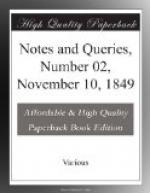It was known some years sooner at Marseilles; for, in 1644, some gentlemen who accompanied M. de la Haye to Constantinople, brought back with them on their return, not only some coffee, but the proper vessels and apparatus for making it. However, until 1660, coffee was drunk only by such as had been accustomed to it in the Levant, and their friends; but that year some bales were imported from Egypt, which gave a great number of persons an opportunity of trying it, and contributed very much to bringing it into general use; and in 1661, a coffee-house was opened at Marseilles in the neighbourhood of the Exchange.
Before 1669, coffee had not been seen at Paris, except at M. Thevenot’s, and some of his friends’; nor scarce heard of but from the account of travellers. In that year, Soliman Aga, ambassador from the Sultan Mahomet the Fourth, arrived, who, with his retinue, brought a considerable quantity of coffee with them, and made presents of it to persons both of the court and city, and it is supposed to have established the custom of drinking it.
Two years afterwards, an Armenian of the name of Pascal, set up a coffee-house, but meeting with little encouragement, left Paris and came to London.
From Anderson’s Chronological History of Commerce, it appears that the use of coffee was introduced into London some years earlier than into Paris. For in 1652 one Mr. Edwards, a Turkey merchant, brought home with him a Greek servant, whose name was Pasqua, who understood the roasting and making of coffee, till then unknown in England. This servant was the first who sold coffee, and kept a house for that purpose in George Yard Lombard Street.
The first mention of coffee in our statute books is anno 1660 (12 Car. II. c. 24), when a duty of 4d. was laid upon every gallon of coffee made and sold, to be paid by the maker.
The statute 15 Car. II. c. 11. Sec. 15. an. 1663, directs that all coffee-houses should be licensed at the general quarter sessions of the peace for the county within which they are to be kept.
In 1675 King Charles II. issued a proclamation to shut up the coffee-houses, but in a few days suspended the proclamation by a second. They were charged with being seminaries of sedition.
The first European author who has made any mention of coffee is Rauwolfus, who was in the Levant in 1573.
* * * * *
DR. DRYASDUST.
Sir,—Do you or any of your readers know anything of the family of that celebrated antiquary, and do you think it probable that he was descended from, or connected with, the author of a work which I met with some time ago, intituled “Wit Revived, or A new and excellent way of Divertisement, digested into most ingenious Questions and Answers. By ASDRYASDUST TOSSOFFACAN. London: Printed for T. E. and are to be sold by most Booksellers. MDCLXXIV.” 12mo. I do not know anything of the author’s character, but he appears to have been a right-minded man, in so far as he (like yourself) expected to find “wit revived” by its digestion into “most ingenious questions and answers;” though his notion that asking and answering questions was a new way of divertisement, seems to indicate an imperfect knowledge of the nature and history of mankind; but my query is simply genealogical.




